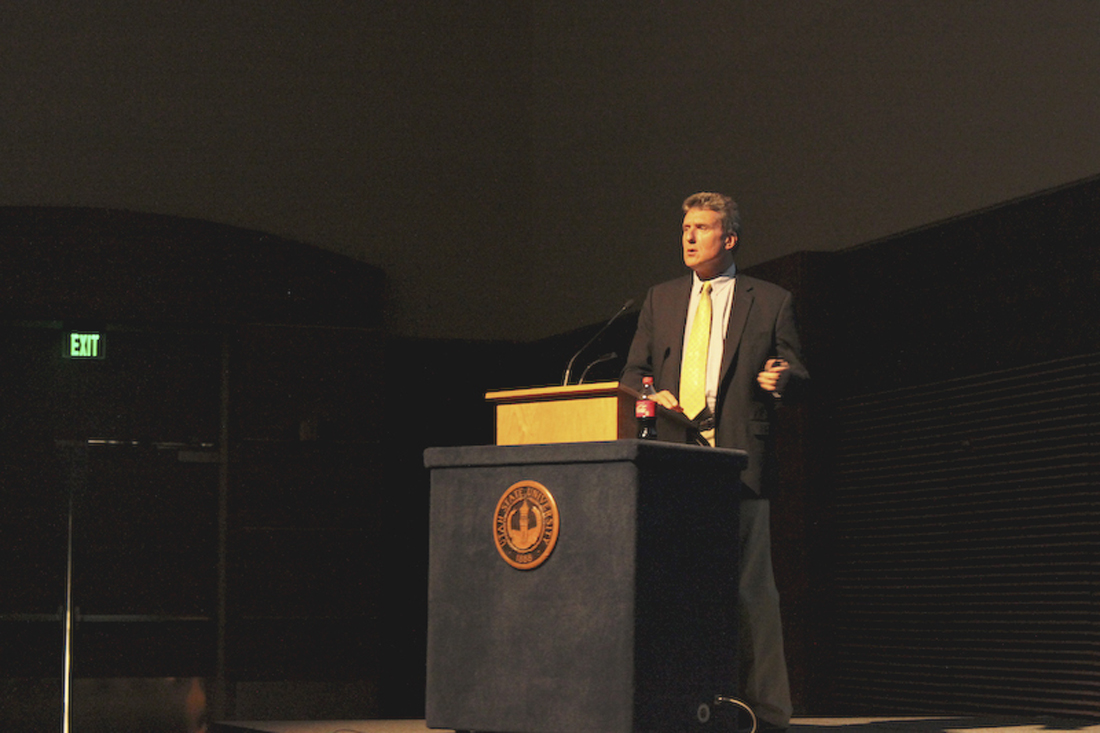Sutton speaks on protecting oceans
USU alumnus Michael Sutton is in the fight to create equal areas of marine and land preservations because scientists say if nothing is done, wild-caught sea food will no longer be what’s for dinner.
“If this continues the catch of the day will be jellyfish, and I’m not sure I look forward to that day,” Sutton said. “We are fishing in a way that is destructive.”
Sutton, vice president of California’s Monterey Bay Aquarium, said the large nets commercial fishers now use are catching more than what they intend to. Because of this, one-third of global fish catch is being discarded. In Sutton’s speech, “Protecting Our Oceans: Establishing Marine Reserves in California,” he conveyed the importance of conserving the ocean in congruence to the land because it composes 70 percent of the earth and 90 percent of the biosphere.
As a complement to Sustainability Week and Natural Resources Week, Nat Frazer, dean of the College of Natural Resources, said he had the perfect excuse to invite Sutton to USU so students could see what they are studying put to work. He said it is equally important students learn about marine conservation as well as land conservation.
“For a land-locked state like Utah, it doesn’t hurt to educate people on the state of ocean conservation, because we aren’t too familiar with it,” Frazer said.
In the human dimensions and national resource management class, Ryan Allred is working on a project to propose how conflicts in New England’s commercial fishing can be resolved. After researching, he and the other members of his group found that New England is one of the most overly fished areas, which prompted them to create solutions. Allred said he knew Sutton’s presentation would be helpful to his research for the project.
Sutton said he hopes to have a state-wide network of marine preservations across the country and bring preserved ocean areas from 1 percent to 20 percent. Currently, California constitutes the largest U.S. marine reserve network. All the preserved areas are organized into regions because the California coast is too far a distance to manage as a state.
“We have to protect the habitat if we want to fish for the future,” Sutton said.
There are a list of things that must happen in order to establish marine conservation areas, including the attainment of a robust legal mandate as well as high-level political support. There must be scientific evidence to back up the reason for investing public and private funding into the preservation projects. Also, the preservation plans must contain an elaborate public process as well as conservation enforcement, Sutton said.
“If you take one of these out, the whole thing falls apart,” he said. “Each of these is a key ingredient.”
California state laws were passed during George W. Bush’s and Bill Clinton’s terms in office. Proposition 84 was passed during the Bush administration and gave $90 million to support ocean protection, which is the largest marine conservation bond that has been distributed in the U.S. thus far. In addition to Prop 84, the Marine Life Protection Act, Marine Life Management Act and California Ocean Protection Act were passed through the House and Senate.
Due to these laws, marine preservation activists, like Sutton, have been able to begin working on saving many of the 250,000 noted marine animals, and maintain ocean water purity. Sutton said scientists predict only 15 percent of ocean species have been discovered and referred to the ocean as “the great unknown.”
It is essential that the ocean receives more attention in the future, which makes sense, Sutton said, because most of planet Earth is composed of water.
“If you were an alien and came to earth by space ship, you wouldn’t call it planet earth, you’d call it planet ocean,” he said.
– catherine.meidell@aggiemail.usu.edu

